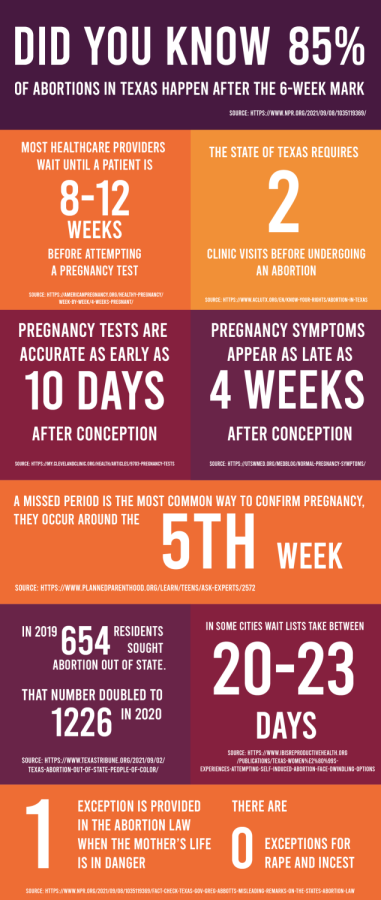Texas’ new abortion law under review by Supreme Court
November 12, 2021
The U.S. Supreme Court heard oral arguments last week on how Texas’ controversial abortion law is enforced but has not yet ruled on the case.
Senate Bill 8, also known as the Texas Heartbeat Act, took effect Sept. 1 and allows private citizens to sue anyone who assists with an abortion after about six weeks into a pregnancy.
A group of abortion providers and the U.S. Department of Justice are suing Texas to stop the law, calling it unconstitutional as it prohibits women’s right to an abortion up to 24 weeks established in Roe v. Wade in 1973.
“I think it’s unethical to sue any doctor because if you think about how many doctors are specialized for abortions, it’s their way of making money,” Scarlet Rios, a nursing major, said “I don’t believe any doctor should be sued.”
Previously, about 85% of all abortions in Texas took place after the six-week mark, so the law bans the majority of abortions in the state.
Since 2018, lawmakers in 11 other states, including Louisiana, Ohio and Missouri have passed similar bills, none of which stood up in court.
Many women are concerned that six weeks is not enough time for them to make an informed decision.
“I think women need more time,” Jennifer Rios, a criminology major, said. “Either they could have financial issues or they’re not a hundred percent sure if they’re making the right decision.”
Amber Avila, a diagnostic sonography major, said six weeks is often not enough time for a woman to even know she is pregnant.
“Not many people get pregnancy symptoms in the beginning of the first trimester,” Avila said. “A lot of women get symptoms around the second or third trimester.”
Another abortion case, Dobbs v. Jackson Women’s Health Organization, is scheduled to go before the Supreme Court on Dec. 1.
The justices will rule on the constitutionality of abortion for that case, and it has the potential to overturn Roe v. Wade.
Soraya Burgos, an art major, said she does not think that will happen.
“I don’t feel that Roe v. Wade would be overturned,” Burgos said. “The Supreme Court has in the past preferred to stick with previous rulings rather than opening a can of worms through appeals or implementing new laws that border on top of contradicting laws.
The Supreme Court voted 5 to 4 to not block Texas’ new abortion law less than 24 hours after it took effect.
Even though many people have said SB 8 is unfair to women, others, like diagnostic medical sonography major Elizabeth Dominguez, said she can see both sides.
“I care for [the new law], but I don’t at the same time,” Dominguez said. “I do believe that a woman should choose what to do with their body since they will be carrying the baby, but for me, I know I will take full responsibility for the child. If I had a friend that wanted to abort at eight weeks, I would have no problem [with it] because she is fighting for her body rights, and I think that is important.”



